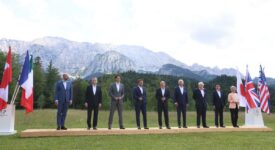The EU reaffirmed its commitment to Western Balkans nations earlier this week (6 May), including by pledging €3.3 billion to help battle the coronavirus pandemic in the region. The recent participation of Ursula von der Leyen, President of the European Commission, at the video-conference of the EU and Western Balkans leaders comes amid fears that some states were aligning themselves with Russia and China. While the Western Balkans has seen an increased Chinese footprint, raising concerns that the region will be a battleground for great power competition, the EU leaders have reassured Western Balkans nations that they will be kept en route for joining the EU.
Despite the little viable market opportunities that the region offers to Chinese investors, the five Western Balkan countries, namely Albania, Bosnia and Hercegovina, Montenegro, North Macedonia, and Serbia – have been included since 2012 in the “16+1” platform with East and Southeast Europe. Later, this regional platform – currently called 17+1 after it was joined by Greece – became an integral part of the Belt and Road Initiative (BRI), and the Western Balkans were increasingly targeted for BRI-related projects as a result of their key strategic geographical position for the Balkan Silk Road, through infrastructure networks and logistical corridors between the Port of Piraeus (Beijing’s flagship project in the region) and markets in Western Europe. Beijing’s geo-economic and political interests aim to use the region as a gateway and transit commercial platform to Western Europe, where the real Chinese interests lie.
“I think there is a lot of appreciation in all the capitals in the region for what the European Union is doing,” said Andrej Plenkovi?, Croatian Prime Minister who was chairing the recent meeting between EU and Western Balkans leaders. “These countries are in a way surrounded by the European Union. If we look at geography there is nowhere else they can go.” In the early stages of the COVID-19 outbreak, Russia, China and Turkey were quicker than the EU to send help, and were celebrated by local politicians. Moreover, in recent months, there was also frustration over the progress of accession talks. EU member talks for Albania and North Macedonia got the green light in March, and as EU’s Enlargement Commissioner Oliver Varhelyi said, they could start within a year, but for them and other aspiring nations, there is a long road to travel.
Article Tags:
Albania · Balkans · Bosnia and Hercegovina · China · COVID-19 · Montenegro · North Macedonia · Serbia · Ursula von der LeyenArticle Categories:
EUROPE'S NEIGHBORHOOD






